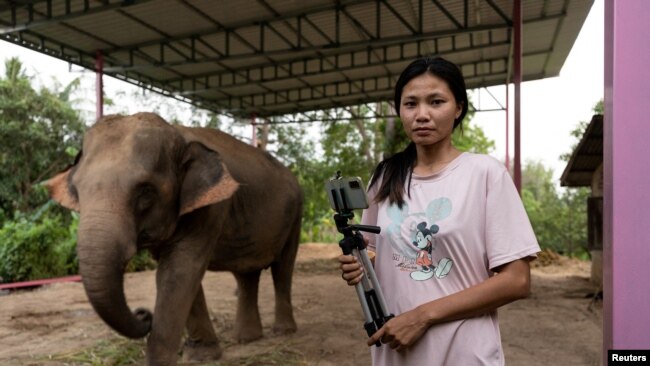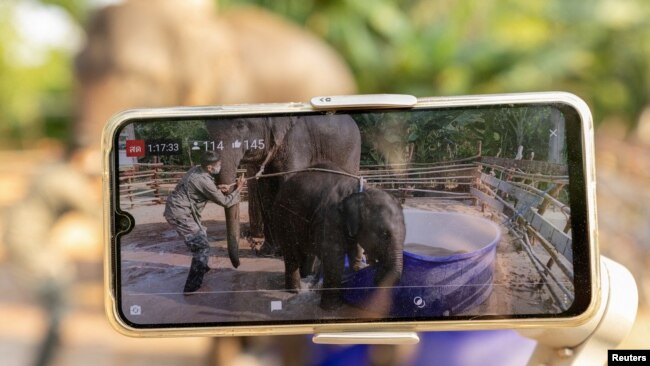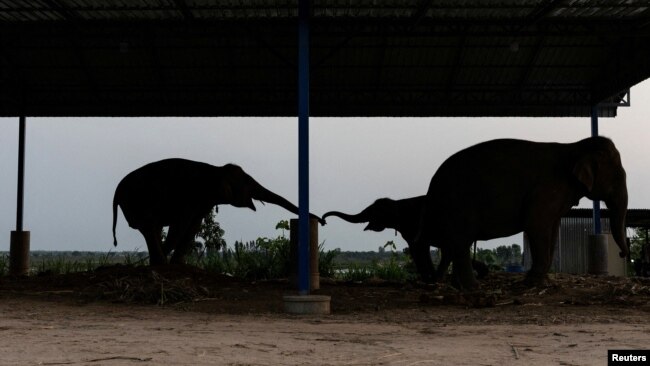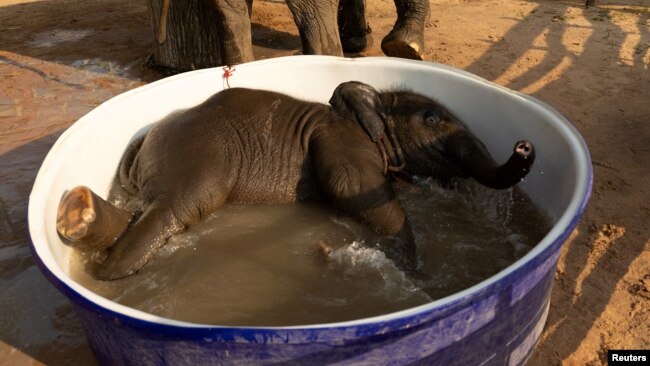에서 살아남는 스트리밍:태국의 Out-Of-Work용 코끼리를 이용하여 시실리 위기의.
Streaming to Survive: Thailand's Out-Of-Work Elephants in Crisis
페이지 정보
작성자 Reuters 작성일 22-09-11 03:01 댓글 0본문

파일 - 코끼리 주인 시리폰 삽막(23)이 2022년 4월 6일 태국 수린의 반타 클랑 마을에서 자신의 집 밖에서 소셜 미디어 라이브 스트리밍에 사용되는 장비를 들고 포즈를 취하고 있습니다.
FILE - Elephant owner Siriporn Sapmak, 23, poses while holding her gear used for social media live-streaming outside her house, at Ban Ta Klang village in Surin, Thailand April 6, 2022.
태국의 북동부 반타 클랑 마을에서, Siriporn Sapmak은 살아남기 위해 돈을 모으기 위해 소셜 미디어에서 그녀의 두 코끼리의 라이브 스트림을 하는 것으로 하루를 시작합니다.
In the northeastern village of Ban Ta Klang in Thailand, Siriporn Sapmak starts her day by doing a livestream of her two elephants on social media to raise money to survive.
학창시절부터 코끼리를 돌봐온 이 23살 소녀는 바나나를 먹이고 코끼리들은 집 뒤편을 돌아다니면서 동물들에게 전화기를 가리킵니다.
The 23-year old, who has been taking care of elephants since she was in school, points her phone to the animals as she feeds them bananas and they walk around the back of her family home.
시리폰은 틱톡과 유튜브에서 몇 시간 동안 라이브 스트리밍을 통해 약 1,000바트(27.46달러)의 기부금을 모을 수 있지만, 그것은 그녀의 코끼리 두 마리를 하루 동안 먹이기에는 충분하다고 말합니다.
Siriporn says she can raise about 1,000 baht ($27.46) of donations from several hours of livestreaming on TikTok and YouTube but that is only enough to feed her two elephants for one day.

파일 - 아기 코끼리 팡마에 플라나모(Pangmaemae Plainamo)가 엄마, 마호트와 함께 2022년 4월 8일 태국 수린의 반타 클랑 마을에서 소셜 미디어를 통해 생중계됩니다.
FILE - Baby elephant Pangmaemae Plainamo, along with her mother and a mahout, are live-streamed on social media at Ban Ta Klang village in Surin, Thailand April 8, 2022.
그것은 전염병이 발생하기 전에 태국의 파타야에서 코끼리 쇼를 함으로써 돈을 벌었던 가족의 새롭고 불안정한 수입원입니다. 그들은 과일을 팔아서 수입을 늘립니다.
It is a new - and insecure - source of income for the family, which before the pandemic earned money by doing elephant shows in the Thai city of Pattaya. They top up their earnings by selling fruit.
전국의 수천 명의 다른 코끼리 주인과 마찬가지로, 삽막 가족은 전염병이 코끼리 캠프와 외국 관광지를 사실상 중단시키면서 고향 마을로 돌아가야 했습니다. 2019년 거의 4천만 명에 달했던 태국에 도착한 외국인 관광객은 작년에 40만 40만 명에 불과합니다.
Like thousands of other elephant owners around the country, the Sapmak family had to return to their home village as the pandemic decimated elephant camps and foreign tourism ground to a virtual halt. Only 400,000 foreign tourists arrived in Thailand last year compared with nearly 40 million in 2019.
어떤 날, Siriporn은 어떤 기부도 받지 못하고 코끼리들의 먹이가 부족해요.
Some days, Siriporn doesn't receive any donations and her elephants are underfed.
"우리는 관광객들이 (돌아오기를) 바라고 있습니다. 만약 그들이 돌아온다면, 우리는 더 이상 라이브 스트림을 하지 않을지도 모릅니다," 라고 그녀가 말했습니다.
"We are hoping for tourists to (return). If they come back, we might not be doing these livestreams anymore," she said.
"만약 우리가 다시 일을 하게 된다면, 코끼리가 먹을 풀을 사기 위해 (안정적인) 수입을 얻을 수 있습니다."
"If we get to go back to work, we get a (stable) income to buy grass for elephants to eat."
에드윈 Wiek 야생 동물 프렌즈 재단 태국의 창시자가 더 나오기 전까지는 관광객들 돌아온다면 태국에서 최소한 천 코끼리가 없“ 적절한 소득” 할 것이라고 추정한다.
Edwin Wiek, founder of Wildlife Friends Foundation Thailand, estimates that at least a thousand elephants in Thailand would have no "proper income" until more tourists return.
공식 기관에 따르면, 태국은 약 3,200마리에서 4,000마리의 포획된 코끼리를 가지고 있으며, 야생에는 3,500마리의 코끼리가 있다고 합니다.
Thailand has about 3,200 to 4,000 captive elephants, according to official agencies, and about 3,500 in the wild.
Week는 가축 개발부가 이 코끼리들을 지원하기 위해 "어떤 종류의" 예산을 찾아야 한다고 말했습니다.
Wiek said the Livestock Development Department needs to find "some kind" of budget to support these elephants.
"그렇지 않으면, 대부분의 가족들에게 그들을 살려두는 것은 어려울 것입니다,"라고 그는 말했습니다.
"Otherwise, it's going to be difficult to keep them alive I think for most families," he said.

파일 - 사슬로 묶인 코끼리들이 2022년 4월 7일 태국 수린 반타 클랑 마을의 지붕 밑에서 코에 손을 뻗고 있습니다.
FILE - Chained elephants reach to touch their trunks under a roof at Ban Ta Klang village in Surin, Thailand, April 7, 2022.
"가족처럼요"
"Like family"
수린 지방에 위치한 태국 코끼리 사업의 진원지인 반타클랑의 가족들은 여러 세대에 걸쳐 코끼리를 돌보고 있으며 코끼리와 밀접한 관계를 맺고 있습니다.
The families in Ban Ta Klang, the epicenter of Thailand's elephant business located in Surin province, have cared for elephants for generations and have a close connection to them.
코끼리 쇼와 놀이기구는 오랫동안 관광객들, 특히 중국인들에게 인기가 있었고, 동물 보호 단체들은 코끼리가 그곳에서 어떻게 다루어지는지에 대한 비판으로 보호구역의 관광업이 생겨났습니다.
Elephant shows and rides have long been popular with tourists, especially the Chinese, while animal rights groups' criticism of how elephants are handled there has given rise to tourism in sanctuaries.
우리는 가족처럼 함께 묶여 있습니다," 라고 시리폰의 어머니 펜리 삽막(60)이 말했습니다.
"We are bound together, like family members," Siriporn’s mother Pensri Sapmak, 60, said.
"코끼리가 없다면, 우리는 우리의 미래가 어떻게 될지 모릅니다. 우리는 그들 덕분에 오늘을 얻었습니다."
"Without the elephants, we don’t know what our future will look like. We have today thanks to them."
포획된 코끼리를 감독하는 가축 개발부에 따르면, 정부는 코끼리를 먹이는 것을 돕기 위해 2020년부터 50만 킬로그램의 풀을 여러 지방에 보냈습니다.
The government has sent 500,000 kilograms of grass across multiple provinces since 2020 to help feed the elephants, according to the Livestock Development Department, which oversees captive elephants.
야생 동물 보호 협회에 따르면 태국의 국가 동물인 코끼리는 매일 150kg에서 200kg을 먹습니다.
Elephants, Thailand's national animal, eat 150 kg to 200 kg each day, according to the Wildlife Conservation Society.

파일 - 2022년 4월 8일 태국 수린의 반타 클랑 마을에서 아기 코끼리 팡마에 플레인모가 목욕을 하고 있습니다.
FILE - Baby elephant Pangmaemae Plainamo takes a bath at Ban Ta Klang village in Surin, Thailand April 8, 2022.
그러나 시리폰과 그녀의 어머니는 아직 어떠한 정부 지원도 받지 못했다고 말했습니다.
Siriporn and her mother, however, said they have not yet received any government support.
"이것은 큰 국가적 문제입니다,"라고 소라와트 타니토 축산개발국장은 말했습니다.
"This is a big national issue," said Livestock Development Department Director-General Sorawit Thanito.
그는 정부가 코끼리와 그들의 보호자들을 도울 계획이며 "예산안과 함께 내각에 방안이 제안될 것"이라고 말했습니다.
He said the government plans to assist elephants and their caretakers and that "measures along with a budget will be proposed to cabinet," without giving a time frame.
정부가 올해 천만 명의 외국인 관광객을 예상하고 있지만, 일부 사람들은 관련된 비용을 고려할 때, 이것이 코끼리 주인을 최고의 관광지로 다시 끌어들이기에는 충분하지 않을 수도 있다고 말합니다. 코끼리 쇼의 주축인 중국인 관광객들도 코로나19 국내 봉쇄 속에 아직 돌아오지 않고 있습니다.
While the government is expecting 10 million foreign tourists this year, some say this may not be enough to lure elephant owners back to top tourist destinations, given the costs involved. Chinese tourists, the mainstay of elephant shows, have also yet to return amid COVID-19 lockdowns at home.
"누가 지금 트럭을 준비할 돈을 가지고 있습니까?" 그리고 그들이 돌아갔을 때 정말 다시 사업을 할 수 있을 정도로 얼마나 많은 보안을 가지고 있습니까?"라고 Wik는 말했습니다.
"Who has the money right now to arrange a truck... and how much security (do) they have that they are really going to have business again when they go back?," said Wiek.
그는 앞으로 1년 동안 더 많은 코끼리들이 사육 상태에서 태어나면서 주인의 압박이 심해질 것으로 예상했습니다.
He expected more elephants to be born in captivity over the next year, exacerbating the pressures on their owners.
펜스리는 "어떤 날은 돈을 벌고, 어떤 날은 돈을 벌지 못하는데, 이는 식탁에 음식이 더 적어질 것이라는 것을 의미합니다."라고 말했습니다.
"Some days we make some money, some days none, meaning there's going to be less food on the table"," said Pensri.
"터널 끝에 불빛이 보이지 않습니다."
"I don't see a light at the end of the tunnel."
1 = 36.4200 바트)
($1 = 36.4200 baht)
출처 : VOANews
댓글목록 0
등록된 댓글이 없습니다.

















